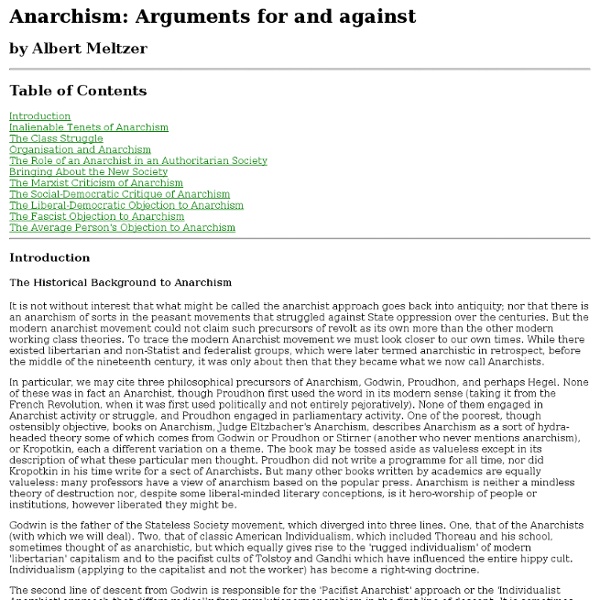Holocaust Timeline
Jump to: 1938 1939 1940 1941 1942 1943 1944 1945 1933 January 30, 1933 - Adolf Hitler is appointed Chancellor of Germany a nation with a Jewish population of 566,000. February 22, 1933 - 40,000 SA and SS men are sworn in as auxiliary police. February 27, 1933 - Nazis burn Reichstag building to create crisis atmosphere. February 28, 1933 - Emergency powers granted to Hitler as a result of the Reichstag fire.
Four Futures
In his speech to the Occupy Wall Street encampment at Zuccotti Park, Slavoj Žižek lamented that “It’s easy to imagine the end of the world, but we cannot imagine the end of capitalism.” It’s a paraphrase of a remark that Fredric Jameson made some years ago, when the hegemony of neoliberalism still appeared absolute. Yet the very existence of Occupy Wall Street suggests that the end of capitalism has become a bit easier to imagine of late. At first, this imagining took a mostly grim and dystopian form: at the height of the financial crisis, with the global economy seemingly in full collapse, the end of capitalism looked like it might be the beginning of a period of anarchic violence and misery.
All About Anarchism
This classic statement of anarchism was written by a diverse group of anarchists in Cardiff around 1980 and it is an interesting historical record of the optimism of mainstream anarchist thought at that time. There is probably more rubbish talked about anarchism than any other political idea. Actually, it has nothing to do with a belief in chaos, death and destruction. Anarchists do not normally carry bombs, nor do they ascribe any virtue to beating up old ladies. It is no accident that the sinister image of the mad anarchist is so accepted.
And There's a Whole Lot We Can Learn from It
February 13, 2012 | Like this article? Join our email list: Stay up to date with the latest headlines via email. On February 8, 1921 twenty thousand people, braving temperatures so low that musical instruments froze, marched in a funeral procession in the town of Dimitrov, a suburb of Moscow.
Zen Habits
“We have more possibilities available in each moment than we realize.” - Thich Nhat Hanh By Leo Babauta I’m not a Zen monk, nor will I ever become one.
Erik Olin Wright
Erik Olin Wright (born 1947, in Berkeley, California) is an American analytical Marxist sociologist, specializing in social stratification, and in egalitarian alternative futures to capitalism. He was the 2012 President of the American Sociological Association.[1] Biography[edit] Erik Olin Wright, born on 9 February 1947 in Berkeley, California, received two BAs (from Harvard College in 1968, and from Balliol College in 1970), and the PhD from University of California, Berkeley, in 1976.
Jakob Bohme
rotten > Library > Biographies > Mad Science > Jakob Bohme You are sitting in front of a computer that would have filled a skyscraper had it been built in 1956. You have terabytes of the world's accumulated wisdom at your fingertips via Google. You have a college education in your pocket. Einstein, Feynman, Gödel, Jung, the Wachowski Brothers, Turing, Fermi, Crick and Watson have all blazed an intellectual trail for you to follow.
Thank You, Anarchists
With their emphasis on participatory direct democracy, the anarchists behind Occupy Wall Street have changed the very idea of what politics could be. Occupy Wall Street protesters hold a general assembly meeting inside an enclosed site near Canal Street on Tuesday, November 15, 2011. (AP Photo/Seth Wenig) It is becoming something of a refrain among the well-meaning multitudes now energized by Occupy Wall Street that the movement needs to shed its radical origins so as to actually get something done. “If they can avoid fetishizing the demand for consensus,” James Miller wrote in late October in the New York Times, “they may be able to forge a broader coalition that includes friends and allies within the Democratic Party and the union movement.” According to some activists, groups like Van Jones’s Rebuild the Dream are poised to turn occupiers into Obama voters. Especially as the 2012 election season starts, the thinking goes, it’s time to get real.
Faith of Our ForeFathers
December 2006 The Founders are once again in vogue. More than 35 books have been published about them just since January according to Gordon Wood, the foremost authority on that era. One of the sub topics of these books concerns the depth of the religious convictions of these men, particularly the Big Six: Washington, Franklin, Jefferson, Madison, Hamilton, and Adams. Authors coming from a conservative religious perspective believe that the Founders were highly religious and that the religious convictions of these men have been underestimated or deliberately ignored. This view is supported by a large and powerful group of Evangelicals who make up about a third of America's population.
Collectivism
Collectivism can be divided into horizontal (or egalitarian) collectivism and vertical (or hierarchical) collectivism. Horizontal collectivism stresses collective decision-making among equal individuals, and is thus usually based on decentralization and egalitarianism. Vertical collectivism is based on hierarchical structures of power and on moral and cultural conformity, and is therefore based on centralization and hierarchy. A cooperative enterprise would be an example of horizontal collectivism, whereas a military hierarchy would be an example of vertical collectivism.[1] Typology[edit] Collectivism has been used to refer to a diverse range of political and economic positions, including nationalism, direct democracy, representative democracy and monarchy.



